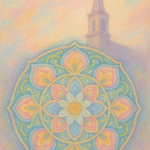What if healing didn’t require a couch or a softly lit room—but instead unfolded in a meadow full of poppies and shasta daisies, where a girl named Wendy turned twelve in a world crafted entirely by imagination? When an inner child shows up inworld, the potential for virtual alchemy exists. Listen to a case study… [Read More]
When Structure Meets Soul: Evolving as a Clinical Supervisor
A student recently asked me a question, causing me to reflect on evolving as a clinical supervisor, giving me pause in the best possible way: How do you balance structure and creativity in your supervision practice, especially when working with clinicians who may be resistant to expressive or nontraditional approaches? The truth is, there’s no… [Read More]
Soulful Without a Steeple: On Being Spiritual But Not Religious
As I listened to the final lecture of Pacifica Graduate Institute‘s Graduate Certificate in Contemporary Analytical Psychology and Neo-Jungian Studies, I realized how much I have gained over the past year of coursework. This final lecture spoke to Carl Jung teasing out religion from spirituality. One of the discussion questions asked. “Are you SBNR (spiritual… [Read More]
Attuning to Archetypes as Therapists and Coaches
In this month’s peer supervision, we turned toward the archetypal field—those universal patterns, images, and energies that move through us and our clients, often beneath conscious awareness. Archetypes are not static labels or fixed identities. They are living, breathing forces. They shape how we show up in the room—how we listen, respond, hold, challenge, or… [Read More]
When the Past Erupts: Archetypes, Abreaction, and Safe Return
When I was in undergraduate and graduate school my practicums and internships were often placements that found me working with clients who had childhood trauma and complex PTSD. Homelessness, domestic violence and child abuse were common descriptors within the agencies I worked in. When I completed grad school I wanted to further my understanding of… [Read More]
A Neo-Jungian-Informed Approach to Clinical Supervision
Most clinical supervision models center on observation, documentation, and ethical reflection—and rightly so. But what if supervision could also be a place of imaginal depth, spiritual inquiry, and transformation? What if we attended not only to the supervisee’s skills, but also to their symbols, their dreams, and their shadows? A neo-Jungian-informed approach to clinical uspervision… [Read More]
The Empty Chair as Mirror, Messenger and Portal
In the quiet space between words, in the moments we pause to listen more deeply—this is where the soul of therapy often speaks. Here we discuss the empty chair as mirror, messenger and portal. One of Gestalt therapy’s most evocative techniques is the empty chair. Traditionally, it invites a client to engage in a dialogue… [Read More]
Online Coaching and Therapy: Giving Rise to Numinous Moments
When participants in an online session connect—whether through video, voice, or even text—they encounter something quietly profound: presence. This isn’t just metaphorical—it’s a measurable, felt sense of being-with that digital theorists have long explored. Lombard and Ditton (2006), whose work informed much of the early thinking around presence in virtual spaces, help us understand this… [Read More]












